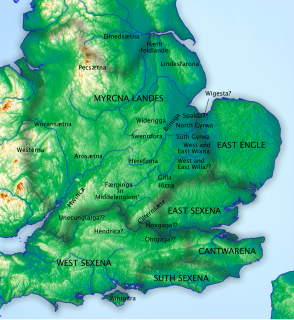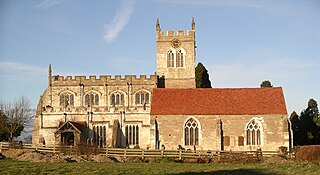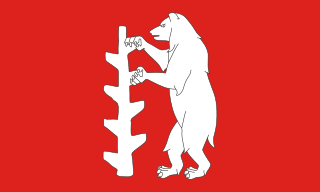
The kingdom of the East Saxons, today referred to as the Kingdom of Essex, was one of the seven traditional kingdoms of the Anglo-Saxon Heptarchy. It was founded in the 6th century and covered the territory later occupied by the counties of Essex, Hertfordshire, Middlesex and Kent. Kings of Essex were frequently subservient to foreign overlords. The last king of Essex was Sigered and in 825, he ceded the kingdom to Ecgberht, King of Wessex.

Offa was King of Mercia, a kingdom of Anglo-Saxon England, from 757 until his death in July 796. The son of Thingfrith and a descendant of Eowa, Offa came to the throne after a period of civil war following the assassination of Æthelbald. Offa defeated the other claimant, Beornred. In the early years of Offa's reign, it is likely that he consolidated his control of Midland peoples such as the Hwicce and the Magonsæte. Taking advantage of instability in the kingdom of Kent to establish himself as overlord, Offa also controlled Sussex by 771, though his authority did not remain unchallenged in either territory. In the 780s he extended Mercian supremacy over most of southern England, allying with Beorhtric of Wessex, who married Offa's daughter Eadburh, and regained complete control of the southeast. He also became the overlord of East Anglia and had King Æthelberht II of East Anglia beheaded in 794, perhaps for rebelling against him.

Ecgberht, also spelled Egbert, Ecgbert, or Ecgbriht, was King of Wessex from 802 until his death in 839. His father was Ealhmund of Kent. In the 780s Ecgberht was forced into exile by Offa of Mercia and Beorhtric of Wessex, but on Beorhtric's death in 802 Ecgberht returned and took the throne.

Æthelred was King of Mercia from 675 until 704. He was the son of Penda of Mercia and came to the throne in 675, when his brother, Wulfhere of Mercia, died. Within a year of his accession he invaded Kent, where his armies destroyed the city of Rochester. In 679 he defeated his brother-in-law, Ecgfrith of Northumbria, at the Battle of the Trent: the battle was a major setback for the Northumbrians, and effectively ended their military involvement in English affairs south of the Humber. It also permanently returned the kingdom of Lindsey to Mercia's possession. However, Æthelred was unable to re-establish his predecessors' domination of southern Britain.

Wulfhere or Wulfar was King of Mercia from 658 until 675 AD. He was the first Christian king of all of Mercia, though it is not known when or how he converted from Anglo-Saxon paganism. His accession marked the end of Oswiu of Northumbria's overlordship of southern England, and Wulfhere extended his influence over much of that region. His campaigns against the West Saxons led to Mercian control of much of the Thames valley. He conquered the Isle of Wight and the Meon valley and gave them to King Æthelwealh of the South Saxons. He also had influence in Surrey, Essex, and Kent. He married Eormenhild, the daughter of King Eorcenberht of Kent.

Coenwulf was the King of Mercia from December 796 until his death in 821. He was a descendant of a sibling of King Penda, who had ruled Mercia in the middle of the 7th century. He succeeded Ecgfrith, the son of Offa; Ecgfrith only reigned for five months, and Coenwulf ascended the throne in the same year that Offa died. In the early years of Coenwulf's reign he had to deal with a revolt in Kent, which had been under Offa's control. Eadberht Præn returned from exile in Francia to claim the Kentish throne, and Coenwulf was forced to wait for papal support before he could intervene. When Pope Leo III agreed to anathematize Eadberht, Coenwulf invaded and retook the kingdom; Eadberht was taken prisoner, was blinded, and had his hands cut off. Coenwulf also appears to have lost control of the kingdom of East Anglia during the early part of his reign, as an independent coinage appears under King Eadwald. Coenwulf's coinage reappears in 805, indicating that the kingdom was again under Mercian control. Several campaigns of Coenwulf's against the Welsh are recorded, but only one conflict with Northumbria, in 801, though it is likely that Coenwulf continued to support the opponents of the Northumbrian king Eardwulf.

Coenred was king of Mercia from 704 to 709. Mercia was an Anglo-Saxon kingdom in the English Midlands. He was a son of the Mercian king Wulfhere, whose brother Æthelred succeeded to the throne in 675 on Wulfhere's death. In 704, Æthelred abdicated in favour of Coenred to become a monk.

Wiglaf was King of Mercia from 827 to 829 and again from 830 until his death. His ancestry is uncertain: the 820s were a period of dynastic conflict within Mercia and the genealogy of several of the kings of this time is unknown. Wigstan, his grandson, was later recorded as a descendant of Penda of Mercia, so it is possible that Wiglaf was descended from Penda, one of the most powerful seventh-century kings of Mercia.
Beorhtwulf was King of Mercia, a kingdom of Anglo-Saxon England, from 839 or 840 to 852. His ancestry is unknown, though he may have been connected to Beornwulf, who ruled Mercia in the 820s. Almost no coins were issued by Beorhtwulf's predecessor, Wiglaf, but a Mercian coinage was restarted by Beorhtwulf early in his reign, initially with strong similarities to the coins of Æthelwulf of Wessex, and later with independent designs. The Vikings attacked within a year or two of Beorhtwulf's accession: the province of Lindsey was raided in 841, and London, a key centre of Mercian commerce, was attacked the following year. Another Viking assault on London in 851 "put Beorhtwulf to flight", according to the Anglo-Saxon Chronicle; the Vikings were subsequently defeated by Æthelwulf. This raid may have had a significant economic impact on Mercia, as London coinage is much reduced after 851.
Ceolwulf II was the last king of independent Mercia. He succeeded Burgred of Mercia who was deposed by the Vikings in 874. His reign is generally dated 874 to 879 based on a Mercian regnal list which gives him a reign of five years. However, D. P. Kirby argues that he probably reigned into the early 880s. By 883, he had been replaced by Æthelred, Lord of the Mercians, who became ruler of Mercia with the support of Alfred the Great, king of Wessex.
The Ġewisse was a tribe or clan of Anglo-Saxon England, based in the upper Thames region around Dorchester on Thames.

The Tribal Hidage is a list of thirty-five tribes that was compiled in Anglo-Saxon England some time between the 7th and 9th centuries. It includes a number of independent kingdoms and other smaller territories and assigns a number of hides to each one. The list of tribes is headed by Mercia and consists almost exclusively of peoples who lived south of the Humber estuary and territories that surrounded the Mercian kingdom, some of which have never been satisfactorily identified by scholars. The value of 100,000 hides for Wessex is by far the largest: it has been suggested that this was a deliberate exaggeration.
Frithuwald was a seventh-century Anglo-Saxon ruler in Surrey, and perhaps also in modern Berkshire and Buckinghamshire, who is known from two surviving charters. He was a sub-king ruling under King Wulfhere of Mercia. According to late hagiographical materials, he was a brother-in-law of Wulfhere. The monks of Saint Peter's Minster, Chertsey, revered Frithuwald, whom they considered the founder of their monastery, as a saint.

The Ismere Diploma is a charter of 736, in which Aethelbald of Mercia grants ten hides of land near Ismere to Cyneberht, his "venerable companion", for the foundation of a coenubium (minster).

The Kingdom of the East Angles, today known as the Kingdom of East Anglia, was a small independent kingdom of the Angles comprising what are now the English counties of Norfolk and Suffolk and perhaps the eastern part of the Fens. The kingdom formed in the 6th century in the wake of the Anglo-Saxon settlement of Britain. It was ruled by the Wuffingas in the 7th and 8th centuries, but fell to Mercia in 794, and was conquered by the Danes in 869, forming part of the Danelaw. It was conquered by Edward the Elder and incorporated into the Kingdom of England in 918.
The Tomsaete or Tomsæte were a tribe or clan in Anglo-Saxon England living in the valley of the River Tame in the West Midlands of England from around 500 and remaining around Tamworth throughout the existence of the Kingdom of Mercia.
The Husmerae were a tribe or clan in Anglo-Saxon England, possibly forming an early settlement of the Hwicce subkingdom. The Husmerae settled on the banks of the River Stour, prior to 736. They probably took their name from Usmere, a pool on the boundary of Wolverley whose name in preserved in Ismere House in Churchill, Worcestershire. A source cited that the term was derived from British word udso, Welsh ws (water) and Old English mere.
The Pencersæte were a tribe or clan in Anglo-Saxon England. They lived in the valley of the River Penk in the West Midlands, and remained around Penkridge throughout the existence of the Kingdom of Mercia.

















